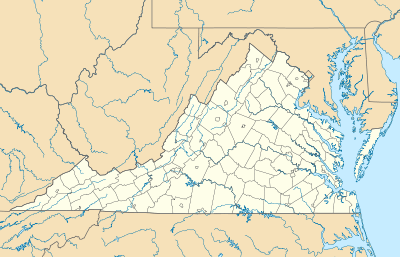Stoneleigh (Stanleytown, Virginia)
|
Stoneleigh | |
 | |
| Location | VA 606, Stanleytown, Virginia |
|---|---|
| Coordinates | 36°44′04″N 79°56′45″W / 36.73444°N 79.94583°WCoordinates: 36°44′04″N 79°56′45″W / 36.73444°N 79.94583°W |
| Area | 16 acres (6.5 ha) |
| Built | 1929-1932 |
| Architectural style | Tudor Revival |
| NRHP Reference # | 82001820[1] |
| VLR # | 044-0087 |
| Significant dates | |
| Added to NRHP | November 24, 1982 |
| Designated VLR | March 16, 1982[2] |
Stoneleigh, the former abode of Governor Thomas B. Stanley, began its construction in 1929 and it was completed in 1932. It was built in the Tudor Revival-style and crafted out of stone from the nearby Smith River. Stanley inhabited this 25-room mansion until his death in 1970 and his kids then took ownership of the home. In 1980, the Stanley family made a generous donation of 1.2 million dollars of the 1.5 building to Ferrum College, leaving the college 300,000 dollars left to the statement for the Estate.
In 1993 Bill and Barbara Topa had plans on making Stoneleigh into a four-star lodging and dining facility when they purchased the home in 1993. The Topa’s plan did not get completed, and in 1998 Kevin and Whitney Witasick bought Stoneleigh for 800,000. The couple’s ownership of the estate was cut short when Mr. Witasack was charged with tax evasion, tax perjury, and failing to file a tax return when he lied about using the home for business purposes. In 2010, Stoneleigh was again sold but this time to Citimortgage, a New York mortgage company, for 1.12 million dollars. When Citimortgage purchased the grounds, a North Carolina liability company filed a lawsuit against the New York company, claiming they breached contracts with the company to buy the Estate. Stoneleigh Estate is now owned by Stoneleigh Estate, LLC a North Carolina Corporation with ties to the Va area.
Timeline
1929- Thomas and Anne Stanley began building Stoneleigh
1932- Stoneleigh was finished
1961- Gardens redesigned by Charles Gillette
1970- Owner Thomas Stanley died
1980- The estate was donated to Ferrum College. Ferrum put Stoneleigh on the market for 2.675 million dollar because of the high cost of maintaining the estate.
1982 - Listed on the National Register of Historic Places.[1]
1988- Ferrum started using it as a conference center
1989- 2 contacts were made to purchase it for $2.675 million
1993- Ferrum stopped using it as a conference center
1993- Topa bought the home from Ferrum College for $1.25 million
1998- Kevin Witasick bought Stoneleigh for $800,000
2008- Stoneleigh sold for $1.12 million by CitiMortgage
2010- Lawsuit filed over sale of Stoneleigh by Stoneleigh Estate, LLC
2011- Stoneleigh Estate, LLC purchases the home from Citi Mortgage
2012- Stoneleigh Estate, LLC hosts over 20 events/weddings on the Estate for the year
2012- Stoneleigh Estate has a fire (Nov) outbreak from propane gas, burns for five days but does not damage the building
Important people
- Governor Thomas and Anne Stanley- built house
- Bill and Barbara Topa- purchased the house to make it into a bed and breakfast inn.
- Kevin Witasick- past owner of Stoneleigh bought for 800,000 dollars in 1998
- Stoneleigh Estate, LLC purchased the property in July 2011. Current Owner
- Tinsley and McBroom- architect
- Charles Gillette - Formal Gardens
Other important information
Thomas and Anne Stanley’s Estate
57acres
28 rooms
22,000 square feet
Elizabethan-Tudor mansion in English country house style
Ferrum College furnished the house for $300,000 and spent $60,000-$70,000 a year on maintenance.
The Topas spent $98,000 to remodel a garage apartment
Walkways are laid of brick
The former home of the late Governor of Virginia
Bill and Barbara Topa spent $1.5 million to improve Stoneleigh and make it a first-class bed and breakfast inn.
The stately home is admired for architectural beauty and garden grandeur
Stoneleigh Estate, LLC has invested over $1.5 million in current updates at the Estate and has the home to the original desires of the Stanley Family which was to be used by the state and the community as an Event and Cultural Center. The food served at the Estate is from the "garden to the table" dining experience.
other uses for the estate are domestic cultural and educational
References
- 1 2 Staff (2010-07-09). "National Register Information System". National Register of Historic Places. National Park Service.
- ↑ "Virginia Landmarks Register". Virginia Department of Historic Resources. Retrieved 2013-05-12.
Works Cited
- Poole, David. “$2.6 million asked for Stoneleigh.” Roanoke Times & World-News. 25 Nov. 1998. Print. 17 Jan. 2013.
- “A Governor’s Home Now Serves a College.” Southern Living magazine. June. 1983. Print. 17 Jan. 2013. Poff, Mag.“
- “Stoneleigh’s selling price met $2.675 million bid for landmark.” Martinsville Bulletin. 25 Jun. 1989. Print. 28 Jan. 2013.
- Lyle, George. “Stoneleigh owners aim to make it ‘inn’ place.” Martinsville Bulletin. 13 Sep. 1996. Print. 28 Jan. 2013.
- “A Governor’s Home Now Serves a College.” Southern Living. June 1983.+
- Day, Barnie K. “Stoneleigh: Where people go in search of futures.” Martinsville Bulletin. 1 Dec. 1985.
- Lyle, George. “Stoneleigh owns aim to make it ‘inn’ place.” Martinsville Bulletin. 13 Sept. 1996.
- Poff, Mag.”Ex-governor’s home goes on the market.” Roanoke Times. Saturday, Oct. 12. 1996.
- Poole, David.“2.6 million asked for Stoneleigh.” Roanoke Times. Friday, 25 Nov. 1988.
- “Stoneleigh” Martinsville Bulletin. n.d.
- “Stoneleigh’s selling price met.” Martinsville Bulletin. 25 June. 1989.
- “Stoneleigh Stanleytown, Virginia an education and cultural center of Ferrum College and a national historic landmark.” n.d.

